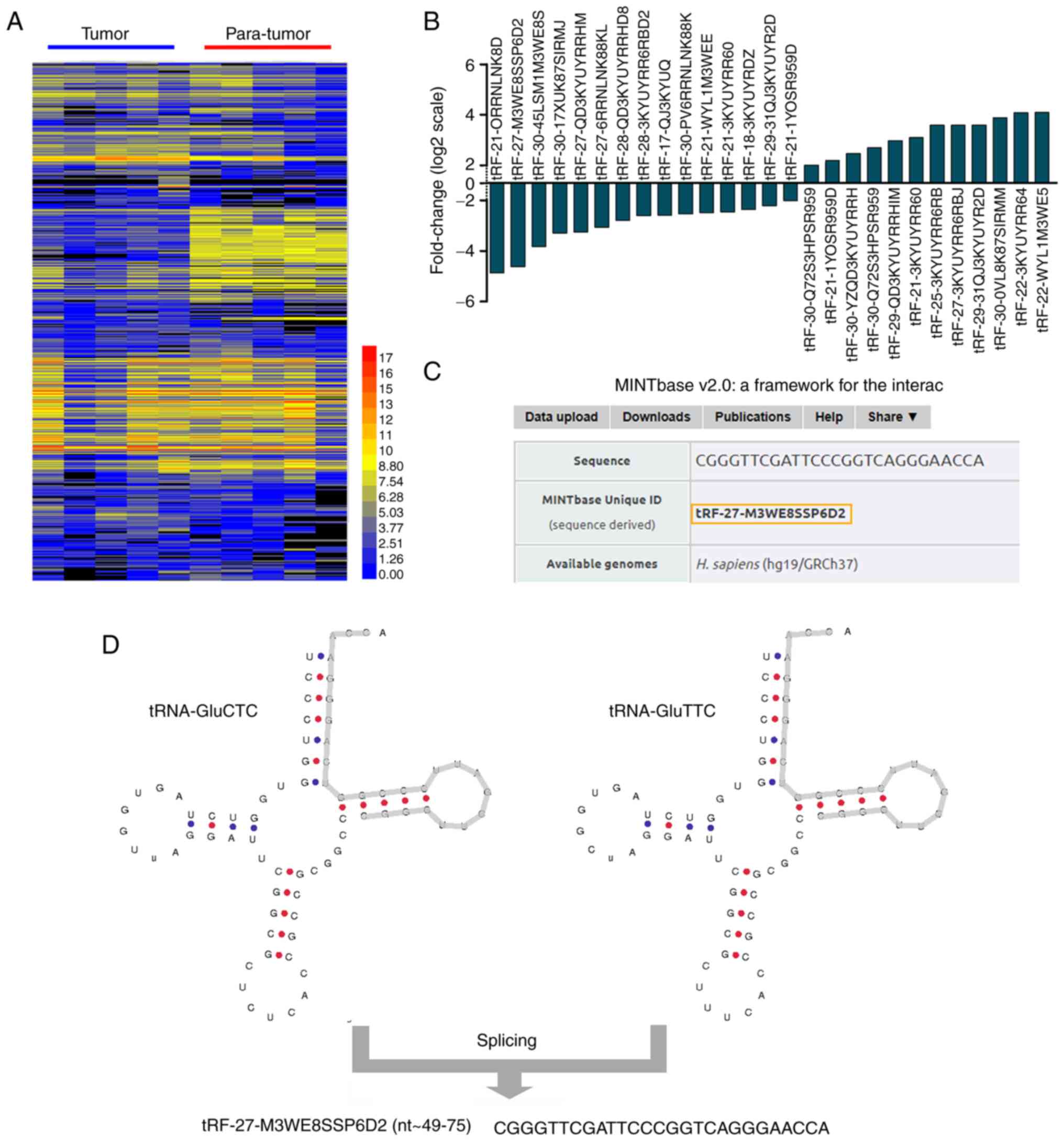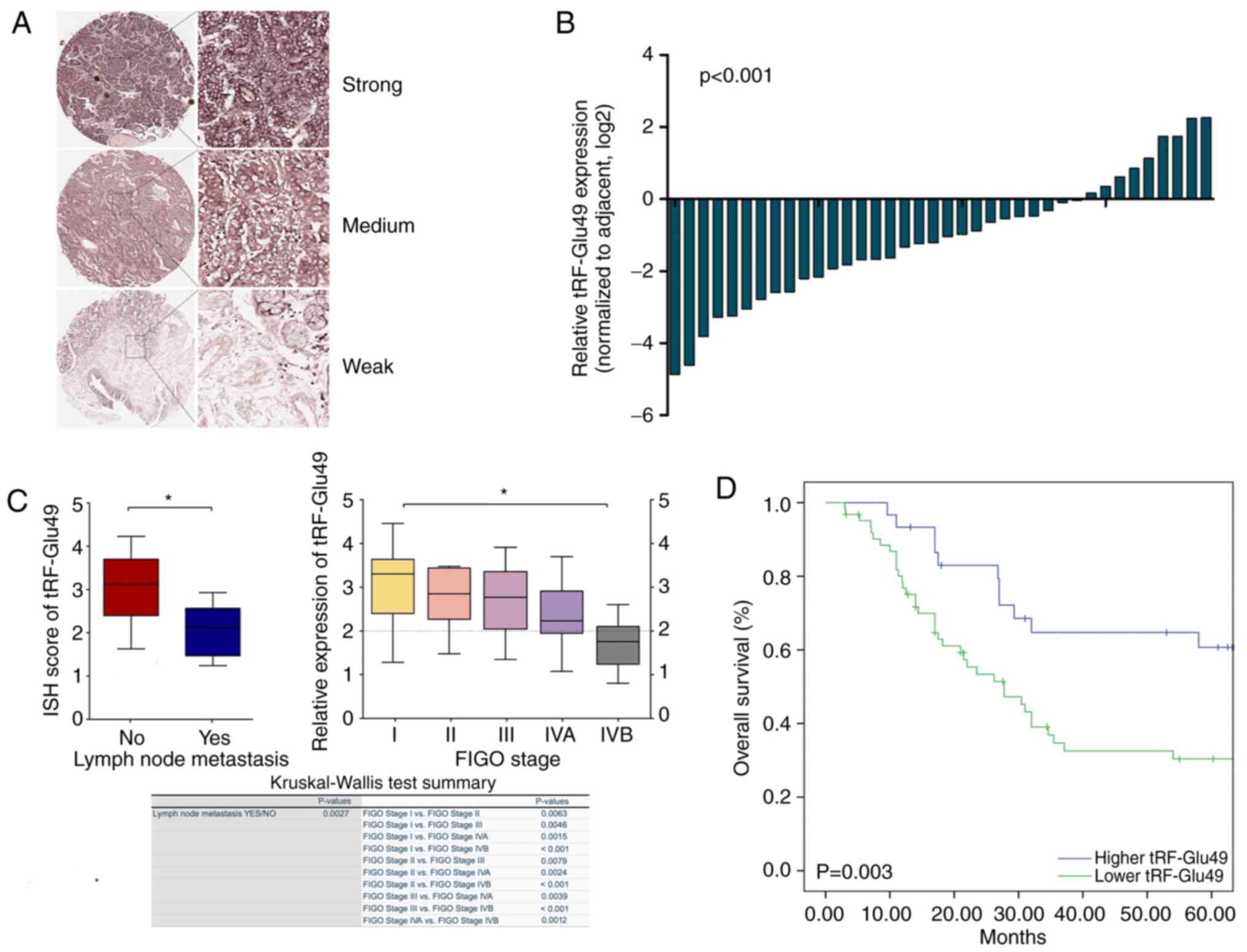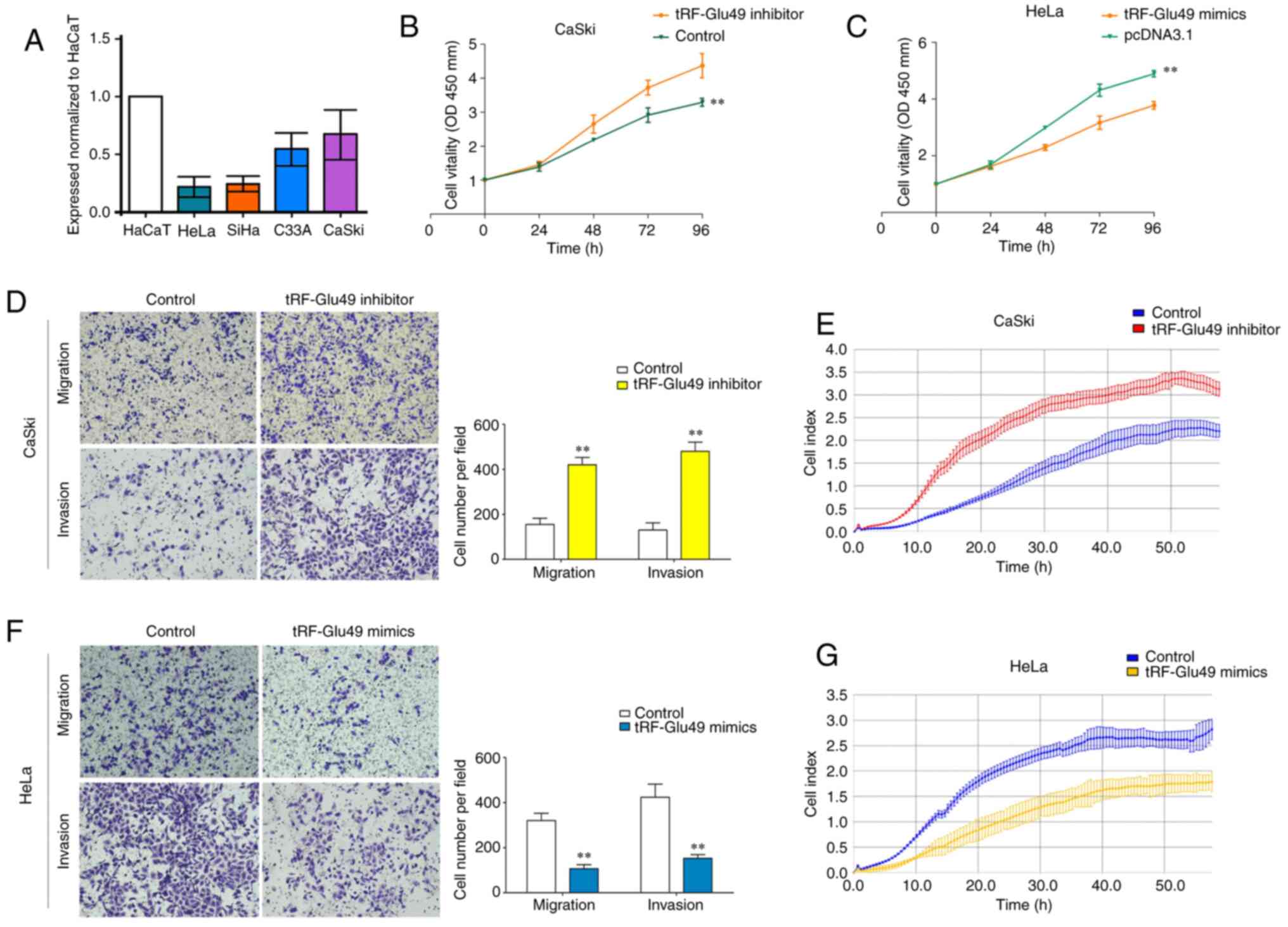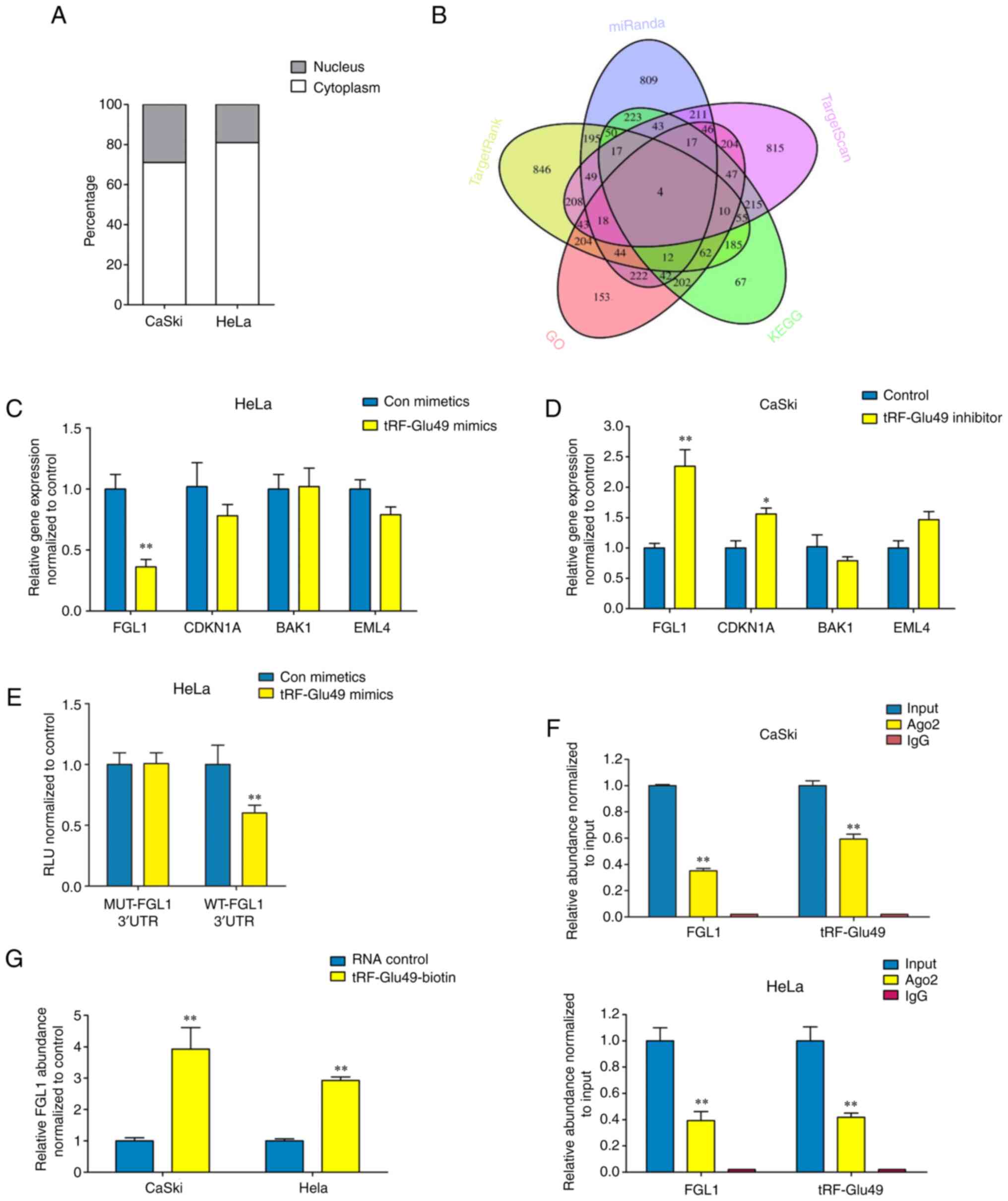|
1
|
Shrestha AD, Neupane D, Vedsted P and
Kallestrup P: Cervical cancer prevalence, incidence and mortality
in low and middle income countries: A systematic review. Asian Pac
J Cancer Prev. 19:319–324. 2018.PubMed/NCBI
|
|
2
|
Sung H, Ferlay J, Siegel RL, Laversanne M,
Soerjomataram I, Jemal A and Bray F: Global cancer statistics 2020:
GLOBOCAN estimates of incidence and mortality worldwide for 36
cancers in 185 countries. CA Cancer J Clin. 71:209–249. 2021.
View Article : Google Scholar : PubMed/NCBI
|
|
3
|
Crafton SM and Salani R: Beyond
chemotherapy: An overview and review of targeted therapy in
cervical cancer. Clin Ther. 38:449–458. 2016. View Article : Google Scholar : PubMed/NCBI
|
|
4
|
Kokka F, Bryant A, Brockbank E, Powell M
and Oram D: Hysterectomy with radiotherapy or chemotherapy or both
for women with locally advanced cervical cancer. Cochrane Database
Syst Rev. 7:CD0102602015.PubMed/NCBI
|
|
5
|
de Freitas AC, da Conceição Gomes Leitão M
and Coimbra EC: Prospects of molecularly-targeted therapies for
cervical cancer treatment. Curr Drug Targets. 16:77–91. 2015.
View Article : Google Scholar : PubMed/NCBI
|
|
6
|
Waggoner SE: Cervical cancer. Lancet.
361:2217–2225. 2003. View Article : Google Scholar : PubMed/NCBI
|
|
7
|
Kawaji H, Nakamura M, Takahashi Y,
Sandelin A, Katayama S, Fukuda S, Daub CO, Kai C, Kawai J, Yasuda
J, et al: Hidden layers of human small RNAs. BMC Genomics.
9:1572008. View Article : Google Scholar : PubMed/NCBI
|
|
8
|
Cole C, Sobala A, Lu C, Thatcher SR,
Bowman A, Brown JWS, Green PJ, Barton GJ and Hutvagner G: Filtering
of deep sequencing data reveals the existence of abundant
dicer-dependent small RNAs derived from tRNAs. RNA. 15:2147–2160.
2009. View Article : Google Scholar : PubMed/NCBI
|
|
9
|
Pekarsky Y, Balatti V, Palamarchuk A,
Rizzotto L, Veneziano D, Nigita G, Rassenti LZ, Pass HI, Kipps TJ,
Liu CG and Croce CM: Dysregulation of a family of short noncoding
RNAs, tsRNAs, in human cancer. Proc Natl Acad Sci USA.
113:5071–5076. 2016. View Article : Google Scholar : PubMed/NCBI
|
|
10
|
Soares AR and Santos M: Discovery and
function of transfer RNA-derived fragments and their role in
disease. Wiley Interdiscip Rev RNA. 8:doi: 10.1002/wrna.1423. 2017.
View Article : Google Scholar : PubMed/NCBI
|
|
11
|
Kumar P, Kuscu C and Dutta A: Biogenesis
and function of transfer RNA-related fragments (tRFs). Trends
Biochem Sci. 41:679–689. 2016. View Article : Google Scholar : PubMed/NCBI
|
|
12
|
Keam SP and Hutvagner G: tRNA-derived
fragments (tRFs): Emerging new roles for an ancient RNA in the
regulation of gene expression. Life (Basel). 5:1638–1651.
2015.PubMed/NCBI
|
|
13
|
Huang B, Yang H, Cheng X, Wang D, Fu S,
Shen W, Zhang Q, Zhang L, Xue Z, Li Y, et al: tRF/miR-1280
suppresses stem cell-like cells and metastasis in colorectal
cancer. Cancer Res. 77:3194–3206. 2017. View Article : Google Scholar : PubMed/NCBI
|
|
14
|
Li S, Shi X, Chen M, Xu N, Sun D, Bai R,
Chen H, Ding K, Sheng J and Xu Z: Angiogenin promotes colorectal
cancer metastasis via tiRNA production. Int J Cancer.
145:1395–1407. 2019. View Article : Google Scholar : PubMed/NCBI
|
|
15
|
Olvedy M, Scaravilli M, Hoogstrate Y,
Visakorpi T, Jenster G and Martens-Uzunova ES: A comprehensive
repertoire of tRNA-derived fragments in prostate cancer.
Oncotarget. 7:24766–24777. 2016. View Article : Google Scholar : PubMed/NCBI
|
|
16
|
Zhao C, Tolkach Y, Schmidt D, Muders M,
Kristiansen G, Müller SC and Ellinger J: tRNA-halves are prognostic
biomarkers for patients with prostate cancer. Urol Oncol.
36:503.e501–503.e507. 2018. View Article : Google Scholar : PubMed/NCBI
|
|
17
|
Goodarzi H, Liu X, Nguyen HC, Zhang S,
Fish L and Tavazoie SF: Endogenous tRNA-derived fragments suppress
breast cancer progression via YBX1 displacement. Cell. 161:790–802.
2015. View Article : Google Scholar : PubMed/NCBI
|
|
18
|
Honda S, Loher P, Shigematsu M, Palazzo
JP, Suzuki R, Imoto I, Rigoutsos I and Kirino Y: Sex
hormone-dependent tRNA halves enhance cell proliferation in breast
and prostate cancers. Proc Natl Acad Sci USA. 112:E3816–E3825.
2015. View Article : Google Scholar : PubMed/NCBI
|
|
19
|
Balatti V, Pekarsky Y and Croce CM: Role
of the tRNA-derived small RNAs in cancer: New potential biomarkers
and target for therapy. Adv Cancer Res. 135:173–187. 2017.
View Article : Google Scholar : PubMed/NCBI
|
|
20
|
Jang K, Ahn H, Sim J, Han H, Abdul R, Paik
SS, Chung MS and Jang SJ: Loss of microRNA-200a expression
correlates with tumor progression in breast cancer. Transl Res.
163:242–251. 2014. View Article : Google Scholar : PubMed/NCBI
|
|
21
|
Shi J, Zhang Y, Tan D, Zhang X, Yan M,
Zhang Y, Franklin R, Shahbazi M, Mackinlay K, Liu S, et al:
PANDORA-seq expands the repertoire of regulatory small RNAs by
overcoming RNA modifications. Nat Cell Biol. 23:424–436. 2021.
View Article : Google Scholar : PubMed/NCBI
|
|
22
|
Cui Y, Huang Y, Wu X, Zheng M, Xia Y, Fu
Z, Ge H, Wang S and Xie H: Hypoxia-induced tRNA-derived fragments,
novel regulatory factor for doxorubicin resistance in
triple-negative breast cancer. J Cell Physiol. 234:8740–8751. 2019.
View Article : Google Scholar : PubMed/NCBI
|
|
23
|
Sun C, Yang F, Zhang Y, Chu J, Wang J,
Wang Y, Zhang Y, Li J, Li Y, Fan R, et al: tRNA-derived fragments
as novel predictive biomarkers for trastuzumab-resistant breast
cancer. Cell Physiol Biochem. 49:419–431. 2018. View Article : Google Scholar : PubMed/NCBI
|
|
24
|
Lee YS, Shibata Y, Malhotra A and Dutta A:
A novel class of small RNAs: tRNA-derived RNA fragments (tRFs).
Genes Dev. 23:2639–2649. 2009. View Article : Google Scholar : PubMed/NCBI
|
|
25
|
Maute RL, Schneider C, Sumazin P, Holmes
A, Califano A, Basso K and Dalla-Favera R: tRNA-derived microRNA
modulates proliferation and the DNA damage response and is
down-regulated in B cell lymphoma. Proc Natl Acad Sci USA.
110:1404–1409. 2013. View Article : Google Scholar : PubMed/NCBI
|
|
26
|
Loss-Morais G, Waterhouse PM and Margis R:
Description of plant tRNA-derived RNA fragments (tRFs) associated
with argonaute and identification of their putative targets. Biol
Direct. 8:62013. View Article : Google Scholar : PubMed/NCBI
|
|
27
|
Kumar P, Anaya J, Mudunuri SB and Dutta A:
Meta-analysis of tRNA derived RNA fragments reveals that they are
evolutionarily conserved and associate with AGO proteins to
recognize specific RNA targets. BMC Biol. 12:782014. View Article : Google Scholar : PubMed/NCBI
|
|
28
|
Shigematsu M and Kirino Y: tRNA-derived
short non-coding RNA as interacting partners of argonaute proteins.
Gene Regul Syst Biol. 9:27–33. 2015.PubMed/NCBI
|
|
29
|
Yee VC, Pratt KP, Cote HC, Trong IL, Chung
DW, Davie EW, Stenkamp RE and Teller DC: Crystal structure of a 30
kDa C-terminal fragment from the gamma chain of human fibrinogen.
Structure. 5:125–138. 1997. View Article : Google Scholar : PubMed/NCBI
|
|
30
|
Shi AP, Tang XY, Xiong YL, Zheng KF, Liu
YJ, Shi XG, Lv Y, Jiang T, Ma N and Zhao JB: Immune checkpoint LAG3
and its ligand FGL1 in cancer. Front Immunol. 12:7850912021.
View Article : Google Scholar : PubMed/NCBI
|
|
31
|
Sun C, Gao W, Liu J, Cheng H and Hao J:
FGL1 regulates acquired resistance to Gefitinib by inhibiting
apoptosis in non-small cell lung cancer. Respir Res. 21:2102020.
View Article : Google Scholar : PubMed/NCBI
|
|
32
|
Lv Z, Cui B, Huang X, Feng HY, Wang T,
Wang HF, Xuan YD, Li HZ, Ma X, Huang Y and Zhang X: FGL1 as a novel
mediator and biomarker of malignant progression in clear cell renal
cell carcinoma. Front Oncol. 11:7568432021. View Article : Google Scholar : PubMed/NCBI
|
|
33
|
Qian W, Zhao M, Wang R and Li H:
Fibrinogen-like protein 1 (FGL1): The next immune checkpoint
target. J Hematol Oncol. 14:1472021. View Article : Google Scholar : PubMed/NCBI
|
|
34
|
Yan Q, Lin HM, Zhu K, Cao Y, Xu XL, Zhou
ZY, Xu LB, Liu C and Zhang R: Immune checkpoint FGL1 expression of
circulating tumor cells is associated with poor survival in
curatively resected hepatocellular carcinoma. Front Oncol.
12:8102692022. View Article : Google Scholar : PubMed/NCBI
|
|
35
|
Wang J, Sanmamed MF, Datar I, Su TT, Ji L,
Sun J, Chen L, Chen Y, Zhu G, Yin W, et al: Fibrinogen-like protein
1 is a major immune inhibitory ligand of LAG-3. Cell.
176:334–347.e312. 2019. View Article : Google Scholar : PubMed/NCBI
|


















